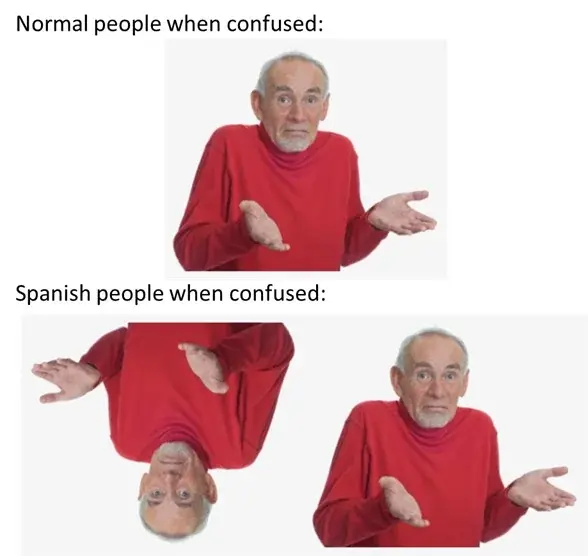this post was submitted on 05 Nov 2023
1581 points (98.5% liked)
Memes
46374 readers
1765 users here now
Rules:
- Be civil and nice.
- Try not to excessively repost, as a rule of thumb, wait at least 2 months to do it if you have to.
founded 5 years ago
MODERATORS
you are viewing a single comment's thread
view the rest of the comments
view the rest of the comments

That might be the case in the dialect you're familiar with, but "¿Me dijiste que no te moleste?" has a different intonation to "Me dijiste que no te moleste." in my Spanish (starting from "dijiste").
As for English, questions normally start either with a question word or a (auxiliary) verb, while affirmations normally start with the subject. See "You told me not to bother you." vs. "Did you tell me not to bother you?". Using just intonation is possible ("You told me not to bother you?!??"), but when in writing, it's usually formatted in a way that highlights it because it usually indicates outrage/disbelief.
Interesting. Afaik what determines a question is a higher pitch, so in your sentence I wouldn't think of the sentence as a question until I hear the intonation of the last word.
Like, toda la oracion puede tener cualquier tono, pero si la última palabra tiene un tono mas agudo (molesteee en vez de moleste) recien cuenta como pregunta.
Me puse a pensar y escuchar conversaciones, fijandome si el tono cambia siempre en la ultima palabra, o en algun otro lado, y en donde vivo (casi) siempre el tono cambia en la ultima palabra, incluso solo la ultima silaba.
Me pregunto si de donde eres toda la oracion (o, desde "dijiste") el tono es más agudo, o si usan otra forma para diferenciar?
The higher pitch for the entire sentence is another option in my Spanish, but indicates outrage.
The version where you hear it's supposed to be a question from the word "dijiste" is more of a request for information, like if your mom yelled something and you're not sure if she said "No me molestes" or "No te sorpreses" or something else that sounds vaguely similar or if she was actually yelling at a fly that was going on her nerves.
The sentence overall becomes more melodic, with the stressed syllables getting a higher pitch and more defined stress.